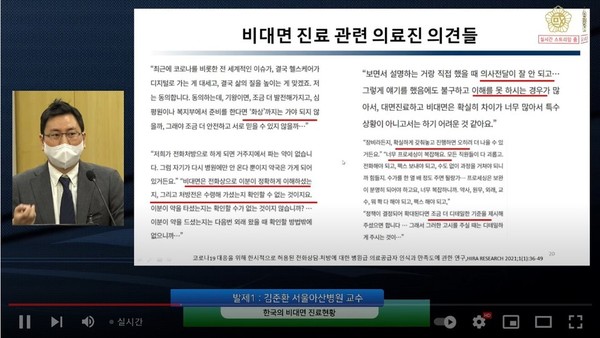For telemedicine to take root in Korea, experts said it should be led by physicians and patients, not by the government.
On Tuesday, lawmakers, health experts, government officials, and civic groups gathered at a forum to discuss deregulation on digital healthcare at the National Assembly Members’ Office Building in Seoul.

The online discussion was aired on the internet.
Professor Kim Jun-hwan at Asan Medical Center and Choi Whan-seok, chairman of the Korean Academy of Family, made presentations. In addition, people from the medical community, the government, and civic groups participated in the discussion.
Kim introduced the status and statistics of telehealth in Korea and shared opinions of doctors, industry officials, and patient groups. For example, according to a survey on 675 doctors by a telemedicine research society under the Seoul Medical Association, over half of the respondents predicted that the demand for telemedicine would increase.
The most cited reason was that there would be an increase in demand for people’s convenience and healthcare, followed by the answer that “medical demand is advancing from treatment to care.”
“In the survey, many doctors said they would use telemedicine if patients want it. The change in the paradigm of healthcare also seems to have had an impact,” Kim said.
However, unlike their positive projection for telemedicine, the satisfaction in non-face-to-face care was low among doctors. In addition, they found it difficult to make medical judgments in remote situations and too complicated to follow telemedicine processes, including drug prescription.
Salary doctors, specialists, public health doctors, and military doctors were particularly discontent with telemedicine. To increase their satisfaction, doctors should have autonomy in telemedicine, Kim said.
Doctors also worry that telehealth could reach its full potential because of the government’s low reimbursement policy and lack of safety and efficacy. In addition, Kim said that they worry telemedicine could violate the face-to-face treatment principle, and remote patient care might disrupt the medical delivery system.
Kim urged the government to take institutional measures to address those concerns.
Choi introduced how telemedicine was progressing in foreign countries.
According to Choi, countries like Japan and Canada have already approved remote patient care and granted health insurance coverage for telemedicine.
In the wake of Covid-19, the proportion of Japanese medical institutions providing telemedicine expanded from 1 percent to 15 percent.
In Canada, in-person patient care decreased about 22 percent, meaning that telehealth was expanding.
“In Korea, people should stop debating whether to start telemedicine, establish standards for telemedicine quickly, and come up with plans to provide telehealth safely,” Choi said.
He also emphasized the importance of contactless care, led by the attending doctor and the patient.
Choi went on to say that to provide quality primary care, the government should allow attending doctors to visit patients and provide telemedicine at the same time.
“The issue is safety. There have been safety reviews on telemedicine since 30 years ago overseas, and they concluded that telemedicine was safe,” he said.
“But the premise is that telemedicine is not for all diseases but chronic diseases management by the attending physician.”
He criticized the Korean government for pushing for telemedicine without giving autonomy to doctors and patients.
Korea Venture Business Association’s Digital Healthcare Policy Committee said the latest forum aimed to discuss legal and regulatory improvement plans. The need for legislative and regulatory improvement was rising amid the fast digital transformation of the healthcare sector.
Life Semantics CEO Song Seung-jae, the Digital Healthcare Policy Committee leader, said considering other countries’ telemedicine experience and Korea’s experience that has been temporarily granted since February 2020, contactless care had a significant role in resolving the problem of “medical blind spots.”
“In this forum, I hope that the government could provide guidance and related policy actively so that telemedicine services can be established smoothly in Korea,” he said.

